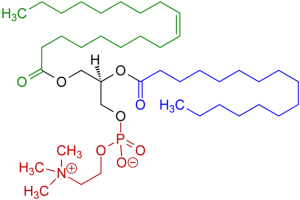Naturally occurring fat compound lecithin may improve memory and slow cognitive decline.

- Increasing brain acetylcholine. This neurotransmitter is particularly involved in memory, and its dysfunction may be linked to disorders such as Alzheimer’s.
- Providing phosphatidylserine. PS is needed for brain cell membranes, and its depletion may be associated with age-related cognitive decline.
Overview
Lecithin is a term used to describe a class of yellow-brownish fatty substances found in both plants and animals. It occurs naturally in brain tissue, and is commonly used as a food additive to keep ingredients from separating. Furthermore, lecithin’s major constituent phosphatidylcholine is found in all cellular organisms as a constituent of cell membranes.1
The key active compound in lecithin is the essential nutrient choline. In addition, lecithin derived from soybeans also contains significant concentrations of phosphatidylserine (PS), a fatty compound found in brain cell membranes.
Lecithin may have some value as a nootropic, and has been used for Alzheimer’s, depression, and anxiety. However, current research evidence is conflicting.

How Lecithin Might Help the Brain
Enhancing acetylcholine levels
Lecithin works primarily by suppling choline – an essential nutrient that is required for the production of acetylcholine, a brain neurotransmitter. Acetylcholine is known to play a key role in memory, and its dysfunction can lead to problems such as impaired short-term memory and memory encoding – the process of acquiring new memories.3
In addition, acetylcholine deficiency may also be involved in the development of neurological disorders, such as Alzheimer’s.4
Supplying phosphatidylserine to brain cells
Lecithin derived from soybeans contains roughly 5.9 g of phosphatidylserine (PS) per 100 g, a fatty compound needed for brain cell membranes and myelin. 5 It is believed that PS content in the brain drops as a person ages, which could be one of the explanations for impaired memory and cognitive function. As such, supplementing soy-derived lecithin can help keep PS levels in a healthy range.
Lecithin’s Potential Nootropic Benefits
Lecithin supplements are claimed to support brain health through supplying choline. However, there is little evidence to support this claim, as most studies that have been done on whole lecithin or isolated choline have shown no benefits. It seems that alpha-GPC — another choline-containing compound — may be more effective as a choline source with nootropic activity; and that citicoline, which supplies choline+uridine nootropics, may be the most effective choline source of all.
On the other hand, studies of soy lecithin-derived phosphatidylserine (PS) are far more promising. Current findings suggest that PS can help slow or even reverse the biochemical and structural deterioration that happens in brain cells during aging, helping fight dementia and improving multiple aspects of cognitive function including memory and mood. 7 8
However, it’s important to note that most of these studies used enzymes to extract PS from soy lecithin, rather supplementing whole lecithin. As such, it’s not clear whether PS taken as part of lecithin would have the same effect.
Research
Animal Research
Because of the difficulty of examining a living human brain, most studies of lecithin and choline are performed on rats. Specific findings show that:
- Dietary lecithin from egg yolk and soybeans successfully elevates blood and brain choline, and in turn brain acetylcholine levels in rats9 10
- Phosphatidylserine derived from soybeans appears to “prevent and/or improve senile dementia” in rats11
- Combining the popular nootropic piracetam with choline appears to result in memory “retention scores several times better than piracetam alone” in older rats12
- Dietary intake of choline by pregnant rats and later by the infant may permanently enhance memory, overall cognitive function, and “aid in the lessening or prevention of age-related cognitive impairments” in the offspring13
Human Research
Given the difficulty of finding noninvasive methods of studying the brain, human lecithin research remains limited. Furthermore, current findings are mixed.
There does not appear to be sufficient evidence for the use of lecithin in treating dementia
This paper reviewed 12 studies which tested whether lecithin can improve cognitive impairment or dementia in patients with Alzheimer’s, Parkinson’s, or overall memory problems. Only one study that looked at patients with subjective memory difficulties reported a significant benefit from lecithin.
- The researchers concluded that “Evidence from randomized trials does not support the use of lecithin in the treatment of patients with dementia. A moderate effect cannot be ruled out, but results from the small trials to date do not indicate priority for a large randomized trial”14
Lecithin appears to be an effective way of raising choline, and subsequently acetylcholine
This study tested whether lecithin supplementation is a better method of increasing choline, and subsequently the neurotransmitter acetylcholine, than choline salt. Ten participants ate one of three meals: low-choline control, low-choline plus 3 g choline chloride salt, and low-choline plus 100 g lecithin (choline content equivalent to 3g choline chloride).
Although both the choline and lecithin group saw a large increase in blood choline levels after the meal, lecithin resulted in a 265% rise compared to only 86% for choline chloride, and also persisted for longer (12 hours).
- The researchers concluded that “Lecithin, a natural source of choline produces a considerable increase in the level of free choline in the serum and presumably in that of neuronal acetylcholine”15
Soy lecithin-derived phosphatidylserine (100 mg) appears to improve memory in older adults
In this double-blind, randomized trial, 78 older adults (age 50-69) with mild memory impairment were divided into 3 groups: placebo, 100 mg phosphatidylserine (PS) made from soy lecithin, and 300 mg PS daily for 6 months. The memory score of both PS groups increased substantially compared to placebo, without much difference between the 100 mg and 300 mg dose.
- The researchers concluded that “The oral administration of Soy-PS for 6 months improved memory function, especially delayed recall, in the elderly with memory complaints”16
This randomized, double-blind study tested soy lecithin-derived phosphatidylserine (PS) supplementation as a potential new therapy for attention-deficit hyperactivity disorder (ADHD) in children. Thirty-six children with ADHD were given placebo or 200 mg PS daily for 2 months. The PS group saw significant improvement of ADHD symptoms, short-term memory, and cognitive performance during a visual stimuli test.
- The researchers concluded that “PS supplementation appears to be a safe and natural nutritional strategy for improving mental performance in young children suffering from ADHD”17
Choline 50 mg/kg does not appear to enhance physical or mental ability
This double-blind, crossover study was one of the few to directly test choline’s nootropic and ergogenic potential. Thirteen men took either choline (50 mg/kg body weight) or placebo, performed a treadmill test, and were then tested on their physical and cognitive performance. The study didn’t find any difference between the two treatments.
- The researchers concluded that “In healthy men, supplemental choline did not affect physical or cognitive performance after exhaustive physical activity”18
Dosage Notes
- The ideal dosage of lecithin for nootropic use is not currently known
- However, lecithin supplements suggest doses of 1200 mg taken 2-6 times daily
- May be found in supplement stacks with other nootropics
Supplements in Review Says
- Soy-derived lecithin 1200 mg 2-6 times daily.
Given the scarce and conflicting research evidence on lecithin, there are better options to consider. If you’re looking for an effective source of choline, it appears that alpha-GPC may be the better option. Similarly, as there are few studies on the effects of phosphatidylserine as part of lecithin, it may be better to look for an isolated phosphatidylserine supplement. But if you do want to give lecithin a try, make sure to look for soy-derived versions.
Most lecithin supplements provide 1200 mg capsules to be taken 2-6 times daily. Given the lack of data on dosing in clinical research, and the fact that lecithin is safe even in high amounts, it’s best to follow the doses suggested by lecithin supplements.
Leave a Reply